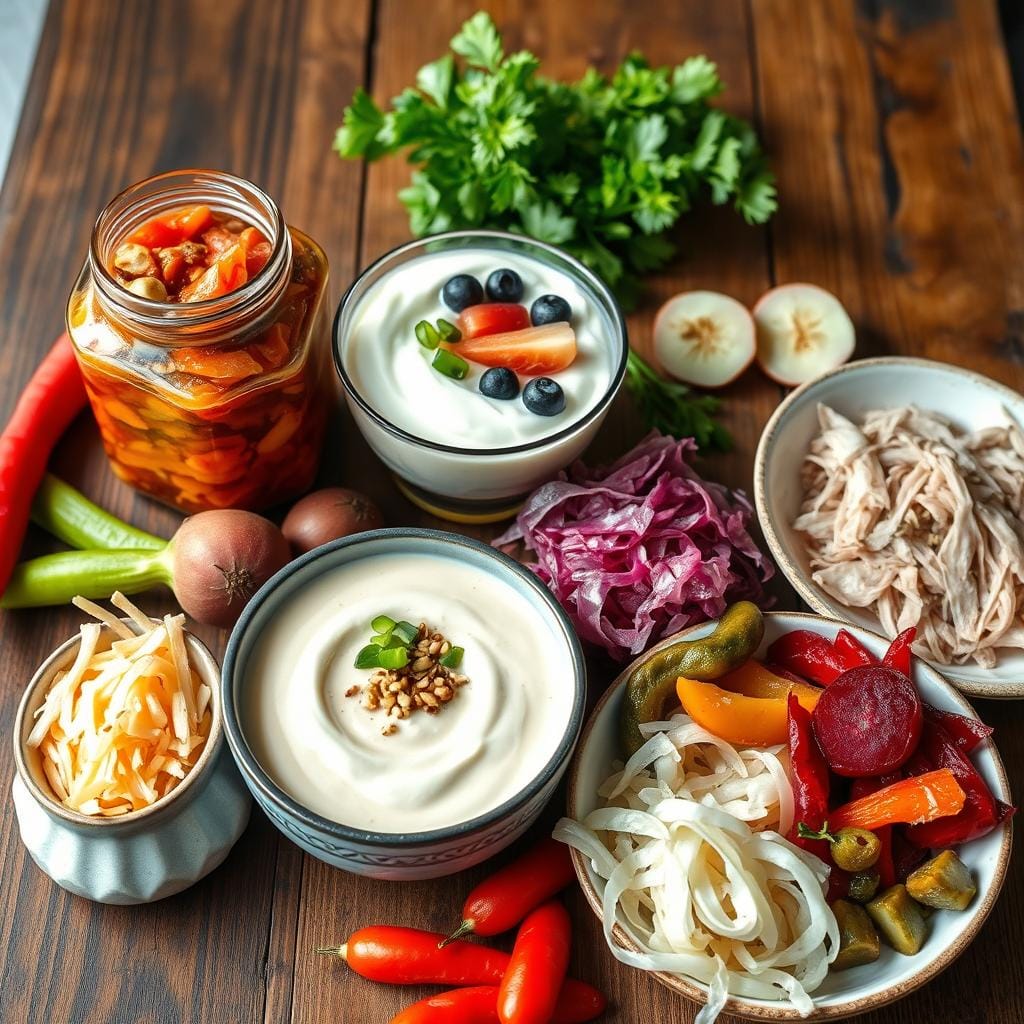Table of Contents
I never thought a simple change in diet could change my life until I found gut health foods. My journey started with constant digestive issues and low energy. But then, I discovered tiny microorganisms that became my secret to feeling alive.
Fermented foods are more than a trend; they’re a tradition of nourishing our bodies. From ancient times to today, probiotics have quietly helped us stay healthy. The kombucha I drink has become a key part of my health routine.
These amazing foods are full of live bacteria that help keep our gut balanced. They do more than just help with digestion. They support our overall health, boost our immune system, and even help our minds stay well.
Key Takeaways
- Probiotics are living microorganisms that support digestive health
- Fermented foods offer natural sources of beneficial bacteria
- Gut health impacts overall physical and mental wellness
- Kombucha and other probiotic foods can enhance immune function
- Simple dietary changes can dramatically improve gut health
What Are Probiotic Foods?
Explore the world of probiotic-rich recipes and discover fermented foods. These foods can change your health from the inside out. They are more than a trend; they’re a path to better wellness.

Probiotic foods are full of good bacteria and yeast. They help keep our gut healthy. This supports our overall health in many ways.
Understanding Probiotic Basics
Probiotic foods have live bacteria and yeast that are good for us. The fermentation process helps these microorganisms grow. This makes fermented foods a natural source of probiotics.
- Contains live microorganisms
- Typically created through fermentation
- Supports digestive system health
- Enhances nutrient absorption
The Gut Health Connection
Our digestive system is like a complex ecosystem. Probiotics help keep it balanced. They play a key role in:
- Improving digestion efficiency
- Supporting immune function
- Reducing inflammation
- Promoting mental wellness
| Probiotic Food | Key Benefits | Probiotic Strains |
|---|---|---|
| Yogurt | Bone health, heart health | Lactobacillus bulgaricus |
| Kefir | Digestive support, inflammation reduction | Multiple diverse strains |
| Sauerkraut | Fiber, vitamin C, gut health | Lactic acid bacteria |
“Probiotics are not just a supplement, they’re a lifestyle choice for optimal health.” – Nutrition Expert
Pro tip: When exploring probiotic-rich recipes, start with small portions and gradually increase your intake to allow your digestive system to adapt.
The Benefits of Probiotics
Probiotics are key gut health foods that boost overall wellness. They help with digestion and even mental health. These good bacteria work quietly to support our health.
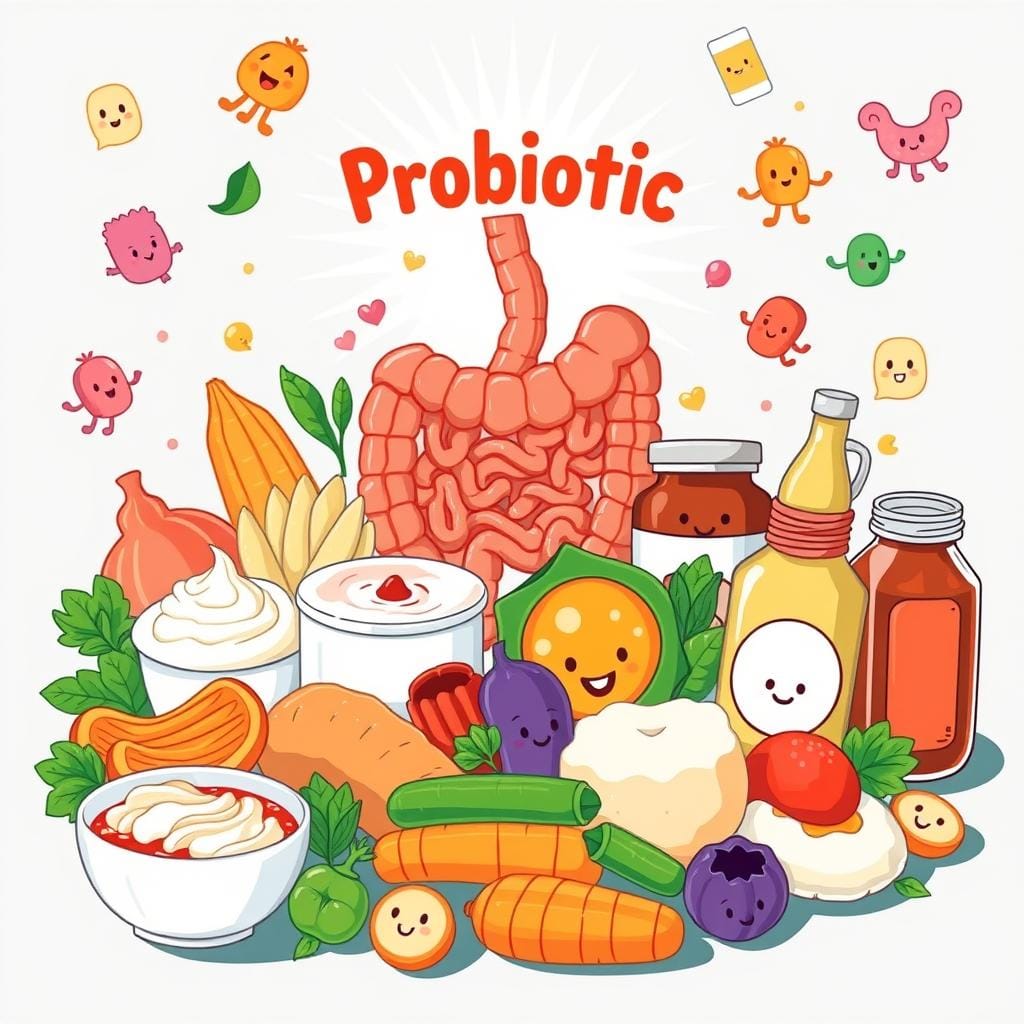
Improved Digestion
Probiotics are vital for digestive health. They help break down food better and improve nutrient absorption. Studies show they can:
- Reduce symptoms of irritable bowel syndrome
- Prevent antibiotic-associated diarrhea
- Support healthy gut microbiome balance
Enhanced Immune Response
Kombucha is more than just a trendy drink. It boosts the immune system by:
- Promoting antibody production
- Strengthening intestinal barrier function
- Reducing inflammation
“Probiotics are like tiny defenders protecting your body from the inside out.” – Nutrition Expert
Mental Wellness Connection
The gut-brain axis shows a strong link between probiotics and mental health. Research suggests they can:
- Reduce anxiety symptoms
- Improve cognitive function
- Support mood regulation
| Probiotic Strain | Primary Health Benefit | Recommended Daily Intake |
|---|---|---|
| Lactobacillus acidophilus | Digestive Health | 1-10 billion CFU |
| Bifidobacterium longum | Immune Support | 1-10 billion CFU |
| Lactobacillus casei | Mental Wellness | 1-5 billion CFU |
Adding kombucha and other probiotic foods to your diet can greatly improve your health.
Top Probiotic Foods to Try
Exploring probiotic-rich recipes can change how you think about gut health. Fermented foods are a great way to increase good bacteria in your body. They support your overall health. Let’s look at some amazing probiotic foods you can add to your meals every day.
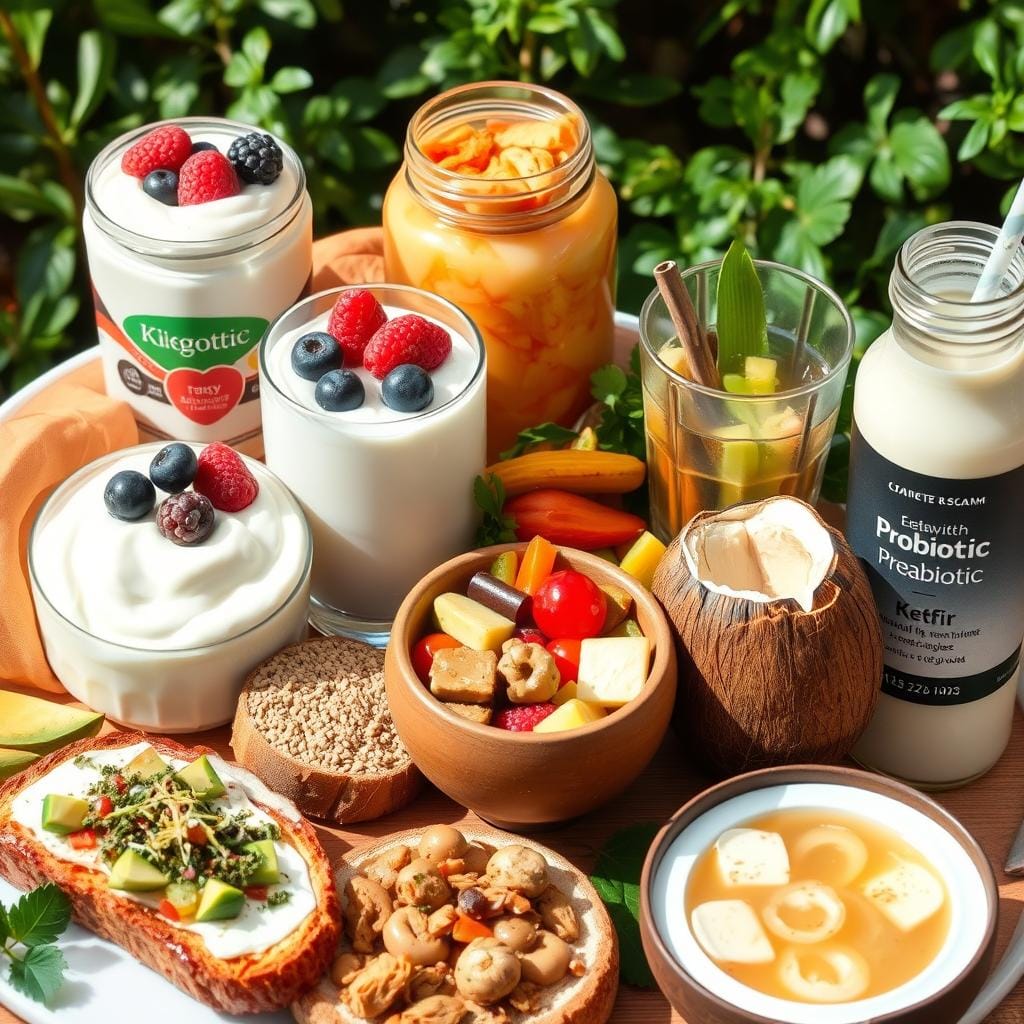
Yogurt: The Classic Probiotic Powerhouse
Yogurt is a well-known probiotic food. A 2021 study showed it can improve gut health, strengthen bones, and lower cancer risk. When picking yogurt, make sure it says live active cultures on the label.
- Contains multiple beneficial bacterial strains
- Rich in protein and calcium
- Available in dairy and non-dairy options
Kefir: A Versatile Fermented Drink
Kefir is more than just a drink. It has more probiotic strains than most yogurts. Its tangy taste is great in smoothies, marinades, and salad dressings.
| Kefir Benefits | Nutritional Value |
|---|---|
| Supports digestive health | High in protein |
| Boosts immune system | Contains essential minerals |
| Helps balance gut microbiome | Low in lactose |
Sauerkraut: A Tangy Probiotic Treat
Sauerkraut is more than probiotics. It’s a tangy cabbage dish full of fiber, vitamins, and good bacteria. It’s great for your digestive health.
Kombucha: The Fizzy Fermented Beverage
A 2014 study found kombucha might help with heart health and blood sugar. This fizzy tea is a fun way to add probiotics to your diet.
Eat diverse, eat fermented – your gut will thank you!
How to Incorporate Probiotic Foods into Your Diet
Making your meals probiotic-rich is easy. I’ll show you tasty ways to add these foods to your diet. This will boost your digestive health with probiotic-rich recipes that are both yummy and good for you.

Breakfast Boost with Probiotic Power
Begin your day with energizing yogurt recipes. They’re full of nutrients. Try making a colorful parfait with:
- Greek yogurt as a creamy base
- Fresh berries for natural sweetness
- Crunchy granola or nuts for texture
- A drizzle of honey for extra flavor
Lunch and Dinner Probiotic Strategies
Midday and evening meals are great for adding fermented foods. Here are some probiotic-rich recipe ideas:
- Sandwich with sauerkraut topping
- Salad dressed with kefir-based vinaigrette
- Tempeh stir-fry with mixed vegetables
- Miso soup as a warming side dish
Smart Snacking with Probiotics
Snack time is perfect for adding beneficial bacteria to your diet. Gut-friendly options include:
- Kombucha as a refreshing drink
- Vegetable sticks with yogurt-based dip
- Small portions of kimchi
- Kefir smoothies
Remember, consistency is key when introducing probiotic foods to your diet!
By adding these probiotic-packed foods to your day, you’ll support a healthy gut. And you’ll enjoy delicious meals too.
Homemade Probiotic Foods
Making probiotic-rich recipes at home is fun and saves money. Fermented foods add good bacteria to your diet. Plus, you control what goes into them.
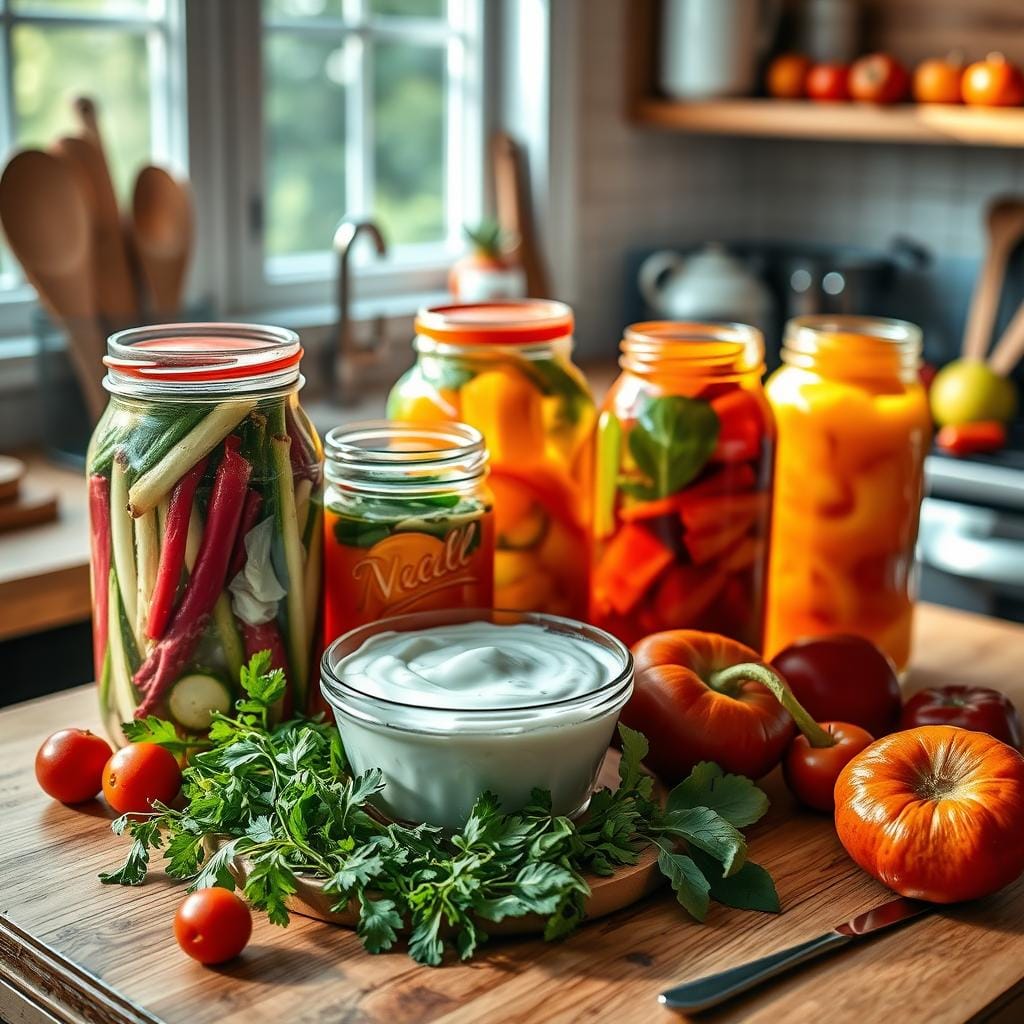
Let’s dive into some easy DIY probiotic food methods. They can turn your kitchen into a health center:
DIY Yogurt: A Creamy Probiotic Delight
Making yogurt at home is easy. You need a few things:
- Fresh milk (dairy or non-dairy)
- Yogurt starter culture
- A thermometer
- Clean glass jars
Sauerkraut: Fermented Cabbage Magic
Sauerkraut is simple to make. You just need:
- Fresh cabbage
- Sea salt
- A large glass jar
- Patience for fermentation
“Fermentation is a delicious way to preserve food and boost your gut health simultaneously.” – Gut Health Expert
Kombucha: Brewing Your Own Fizzy Probiotic Drink
To make kombucha, you need a SCOBY, tea, and sugar. These ingredients turn into a fizzy, tangy drink full of probiotics.
| Probiotic Food | Preparation Time | Difficulty Level |
|---|---|---|
| Yogurt | 6-12 hours | Easy |
| Sauerkraut | 1-4 weeks | Medium |
| Kombucha | 7-10 days | Advanced |
Pro tip: Always keep your equipment clean and follow the right fermentation steps. This ensures your probiotic foods are safe and tasty.
Choosing the Right Probiotic Food Products
Finding the right gut health foods can be hard. When picking fermented foods and probiotics, think carefully. This helps a lot with your digestive health.
Reading probiotic labels needs some effort. Here are some tips to help you choose wisely:
- Look for live active cultures on packaging
- Check specific bacterial strain names
- Verify product hasn’t been pasteurized after culture introduction
Reading Labels Like a Pro
Not all probiotics are the same. A study showed five out of 19 probiotics had fewer bacteria than their labels said. This shows why picking carefully is so important.
| Probiotic Characteristic | What to Look For |
|---|---|
| CFU Count | 1-10 billion CFUs per serving |
| Strain Specificity | Detailed bacterial strain information |
| Storage Requirements | Refrigeration or room temperature stability |
Understanding Live Cultures
When looking at gut health foods, choose products with various probiotics that fit your diet. For those who can’t have dairy, coconut yogurt or water kefir are great options.
“Not all probiotics work the same way for everyone. Individual gut bacteria differ, making personalization key.”
Dietary Preferences Matter
Think about your health goals and what you can’t eat when picking fermented foods. Some probiotics help with anxiety, cholesterol, or digestion. Always talk to a doctor to find the best probiotic for you.
Common Myths About Probiotics
Exploring gut health foods can be tricky, thanks to probiotics myths. Many false beliefs surround these helpful microbes. It’s hard to know what’s true.
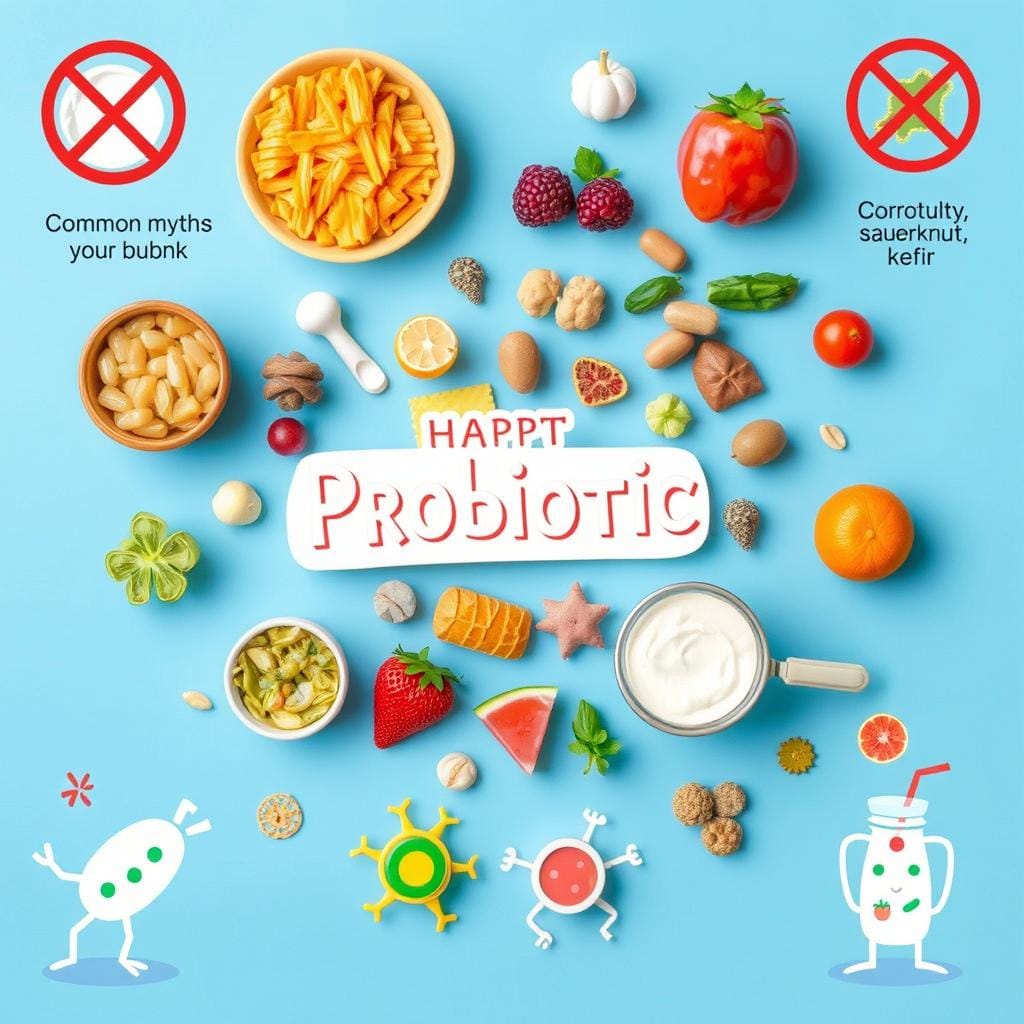
I’ve uncovered some key facts about probiotics. These insights can guide you in choosing the right fermented foods and gut health options. Let’s look at the most common myths:
Myth vs. Reality in Probiotic Understanding
- Myth: All fermented foods are probiotics
- Reality: Pasteurization destroys beneficial bacteria
Many people, 36% to be exact, think all fermented foods are probiotics. But, not all have the good bacteria your gut needs. For example, some yogurts don’t have enough probiotics for health benefits.
Decoding Probiotic Effectiveness
| Common Misconception | Actual Scientific Insight |
|---|---|
| More probiotics are always better | Strain diversity and quality matter more than quantity |
| Supplements are superior to food sources | Probiotic foods offer additional nutritional benefits |
“The effectiveness of probiotics is determined by scientific research, not just the number of colony forming units (CFUs).”
When looking at gut health foods, remember that different probiotics have different effects. It’s important to pick products with proven health benefits.
Key Takeaways for Probiotic Consumers
- Not all fermented foods are probiotics
- Strain-specific benefits are more important than quantity
- Food sources can be more beneficial than supplements
Knowing these details helps you make better choices for your diet. It supports your gut health in the best way.
Probiotics Beyond Food
Looking into gut health foods isn’t just about eating probiotic-rich recipes. As someone who cares about health, I’ve found probiotics in many places. Each has its own benefits and things to think about.

It’s important to know the difference between getting probiotics from food and supplements. This knowledge helps keep your gut healthy.
Supplements vs. Food Sources
Probiotic supplements have special benefits for certain health needs. Research shows they give a strong dose of good bacteria. This is great for specific health goals.
- Supplements have many probiotic strains
- Good for targeted health goals
- Easy for people with certain diets
Finding the Right Balance
Getting your gut health right needs a smart plan. While supplements are helpful, they shouldn’t replace probiotic-rich foods.
| Probiotic Source | Key Benefits | Considerations |
|---|---|---|
| Food Sources | Natural nutrients, diverse microbes | Needs regular eating |
| Supplements | Strong bacterial strains | Quality can vary |
When unsure, talk to a healthcare expert. They can help find the best probiotic plan for you.
I suggest a balanced way. Mix gut health foods with the right supplements. This combo supports your digestive health well.
Recipes Featuring Probiotic Foods
Healthy eating can be fun and easy. I’ve found amazing ways to add probiotic-rich recipes to your meals. These recipes will make your taste buds happy and help your gut health.
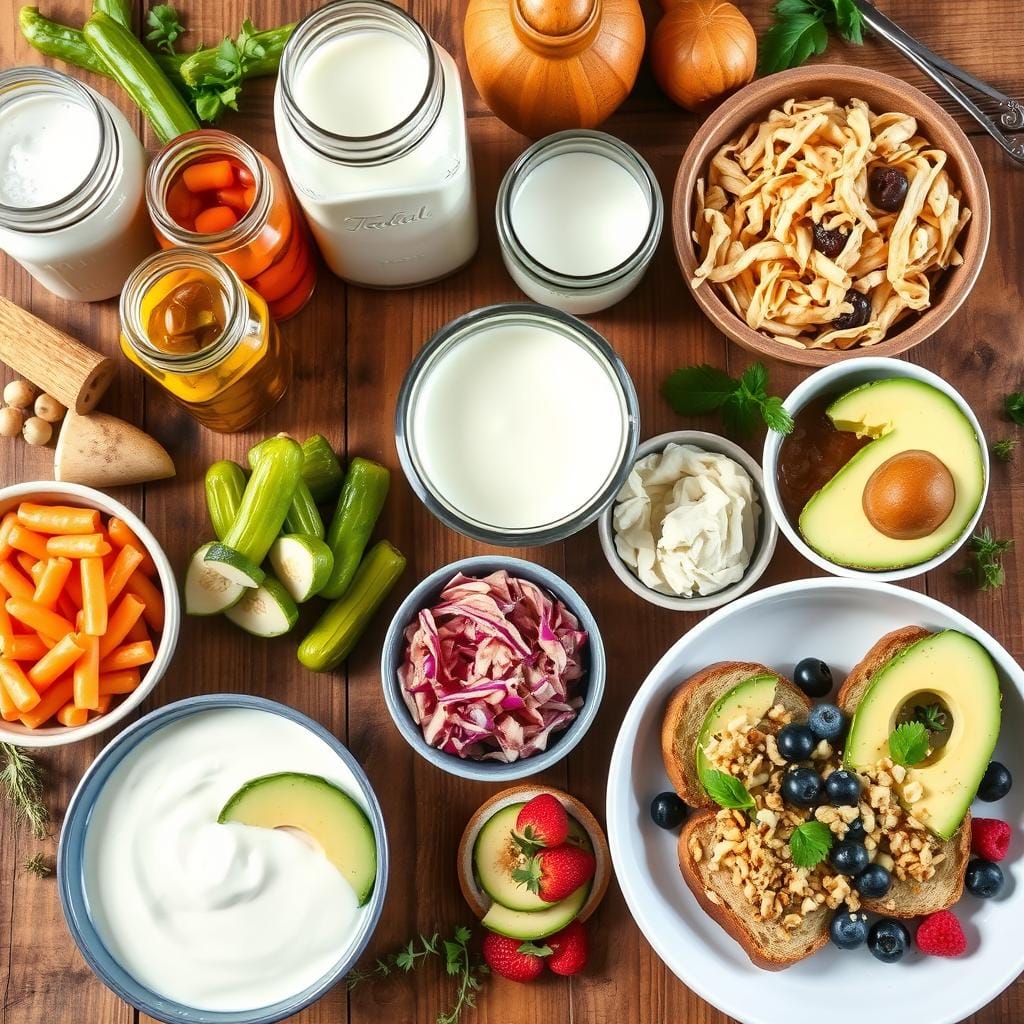
Being creative with probiotic foods is important. Here are some tasty ideas to make eating beneficial bacteria fun and simple.
Delicious Smoothies
Yogurt is great for smoothies because it’s full of nutrients. Try these yummy mixes:
- Kefir makes a creamy strawberry-banana smoothie
- Blueberry and Greek yogurt smoothie with honey
- Green smoothie with kefir, spinach, and mango
Flavorful Dressings and Sauces
Probiotic-rich dressings can make any meal better. A creamy kefir ranch dressing turns any salad into a health boost.
Quick Snacks
Snacks can be tasty and good for you with these probiotic options:
- Yogurt parfait with granola and berries
- Fermented veggie sticks with kefir dip
- Homemade energy balls with probiotics
“Nourishing your gut is an art form that begins in your kitchen.” – Gut Health Expert
Pro tip: Try different probiotic ingredients to keep your meals exciting and your gut happy!
The Role of Prebiotics
Prebiotics are key for gut health. They feed the good bacteria in our gut. This creates a healthy balance of microorganisms that boost our overall health.
Prebiotics are more than just food. Research shows they can greatly improve our health in many ways.
What Exactly Are Prebiotics?
Prebiotics are special plant fibers that feed the good bacteria in our gut. Unlike fermented foods, they are not living things. Instead, they are the food that helps good bacteria grow.
- Found in various plant-based foods
- Stimulate growth of healthy gut bacteria
- Support digestive system function
Synergy with Probiotics
Prebiotics and probiotics work together in a great partnership. Probiotics are live beneficial bacteria. Prebiotics give them the nutrients they need to thrive.
“Prebiotics are like fertilizer for your gut’s good bacteria ecosystem.” – Nutritional Science Research
| Prebiotic Sources | Health Benefits |
|---|---|
| Garlic | Immune system support |
| Onions | Improved digestion |
| Bananas | Enhanced nutrient absorption |
| Whole grains | Reduced inflammation |
A 2022 study found that diverse beneficial bacteria boost our immune system. Eating prebiotic-rich foods helps our body stay healthy for the long term.
Tips for Maintaining a Healthy Gut
Keeping your gut healthy is more than just eating the right foods. Lifestyle choices are key to a strong digestive system and overall health.
- Practice regular stress management techniques
- Prioritize quality sleep
- Engage in consistent physical activity
- Consume diverse fermented foods regularly
Essential Lifestyle Changes
Exercise is vital for gut health. Even light activities boost microbiome diversity. Try to move for at least 30 minutes each day to keep your gut balanced.
“90% of maintaining a healthy gut involves diet, lifestyle changes, and possible medical help.”
Hydration Matters
Water is essential for gut health. It helps remove toxins, aids in nutrient absorption, and keeps your digestive tract healthy. Drink at least 8 glasses of water a day.
Adding fermented foods like yogurt, kefir, and sauerkraut to your diet is beneficial. These foods are tasty and help balance your microbiome.
Improving gut health takes time. Making consistent, thoughtful choices in your diet and lifestyle can lead to noticeable improvements in weeks to months.
Future Trends in Probiotic Foods
The world of gut health foods is changing fast. New research shows a big move towards plant-based probiotic foods (PBPFs). These foods offer health benefits and different tastes. People are now looking for more than just yogurt and kefir.
Kombucha is leading the way in the probiotic market. Scientists are looking into new sources like fruit peels for probiotics. Studies from 2022 and 2023 point to new, targeted probiotic foods for health issues.
Innovations in Probiotic Products
Companies are now making probiotics in many types of foods. This makes gut health easier to get. Research in 2024 shows plant-based foods can be a big help in this area.
Popularity and Accessibility
More people know about gut health and how diet affects it. This is making probiotic products more common. Brands are making probiotics that are easy to use, taste good, and are backed by science.
FAQ
What exactly are probiotic foods?
How often should I consume probiotic foods?
Are probiotic supplements better than probiotic foods?
Can I make probiotic foods at home?
Do probiotics help with mental health?
Are all fermented foods considered probiotic?
What’s the difference between prebiotics and probiotics?
Can probiotics help with digestive issues?
Are there any risks associated with consuming probiotic foods?
Source Links
- Add These 23 Probiotic Foods (and Drinks) to Your Diet for a Happier, Healthier Gut
- 12 Foods to Improve Your Gut Health Overnight
- How to get Natural Probiotics from Food
- 11 Probiotic Foods That Are Super Healthy
- : The Andrew Weil Center for Integrative Medicine
- Probiotics: Health Benefits, Types, and Best Sources
- Probiotics: mechanism of action, health benefits and their application in food industries
- Sources of Probiotics and Their Benefits
- The Best Probiotic and Prebiotic Foods for Babies
- 8 of the Best Probiotic Foods for Health
- Easy Guide: Prebiotic and Probiotic Foods for Gut Health
- Probiotic Foods to Add to Your Diet
- 5 natural probiotic foods you can make at home from scratch
- 7 Gut-Healthy Recipes Featuring Probiotic-Packed Fermented Foods
- 7 Probiotic Drink Recipes For A Healthy Gut
- Which Probiotic Is Right for You?
- How to Choose the Best Probiotic for Your Health, According to a Pharmacist
- 23015_Activia_Yogurt&Gut_Fact&Myth_Mech
- Probiotics and prebiotics: What you need to know for a balanced gut – BJC HealthCare
- best gastro hospitals in Surat The Role of Probiotics in Digestive Health: Myths vs. Facts
- Probiotic Supplements vs Food: Which is Better for Gut Health?
- Probiotics, Prebiotics, and Postbiotics: What Are They and Why Are They Important? | Healthful Nutrition
- 25 Gut-Friendly Recipes to Make for Dinner
- 5 natural probiotic foods you can make at home from scratch
- 15 Gut-Boosting Probiotic Breakfast Recipes | Natural Gut Health
- Probiotics and Prebiotics: What’s the Difference?
- Prebiotics and Probiotics for Gastrointestinal Disorders
- The Role of Prebiotics in Modulating Gut Microbiota: Implications for Human Health
- Keeping a Healthy Gut : USDA ARS
- 16 Science-Backed Ways To Improve Gut Health
- A Basic Guide to Restore Gut Health – Allied Digestive Health
- Plant-based probiotic foods: current state and future trends – PubMed
- Plant-based probiotic foods: current state and future trends – Food Science and Biotechnology

